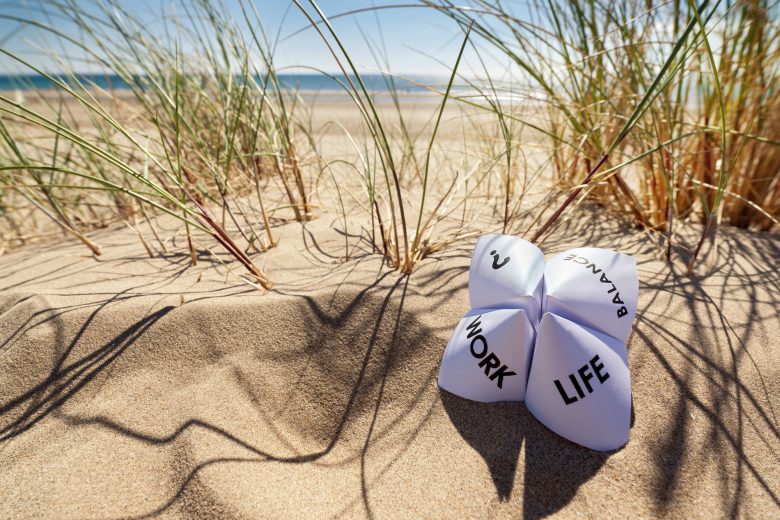Work-Life Balance is a buzz phrase that you have no doubt come across over the last few years, and it isn’t going to disappear anytime soon. According to the Cambridge Dictionary online, it is the amount of time you spend doing your job compared with the amount of time you spend with your family and doing things you enjoy. It’s how your time is split between your professional and personal needs.
It is undeniable that work-life balance is vital to get right. For your business, it maintains productivity, reduces downtime through sick days and burnout, and contributes to your workplace culture. Chronic stress is considered one of the most significant contributors to physical issues in the workplace. From aches and pains to more serious issues like hypertension and digestive problems, all can be attributed to having a poor work-life balance. It also impacts mental health, increasing the likeliness of anxiety and depression. And anyone who has been affected by these conditions will understand how they can impact every aspect of a person’s life, personally and professionally. By promoting a healthy balance at your company, you can help your team stay healthier, and you can protect your productivity and your business.
Let’s look at what work-life balance means to different generations of workers.
Baby Boomers
Born between 1946 and 1964, this generation was born into the prosperity that followed the end of World War II. Because their parents grew up during the Great Depression, they were taught to value hard work. They tend to stay with employers longer, and as a result, currently occupy senior positions. Having a work-life balance was not a priority for this generation. However, some may desire a more flexible schedule as they retire.
Generation-X
Typically born between 1965 and 1980, they saw their parents’ habits and poor work-life balance (Baby Boomers). They experienced firsthand the effects of this on their family units. They witnessed the increase in divorce rates among their parents. As a result, they have put more emphasis on finding a balance. They are more likely to use their allowed time-off and look at potential employers’ perks, such as maternity/paternity leave, remote work, and flexible hours.
Millennials
It’s estimated that by 2025 they will represent 75% of the workforce. This is important to know because, as an employer, this is your hiring pool. You need to understand their needs and wants to create an attractive employer profile for them.
They were born into a time when they are burdened by extreme student loan debt and soaring housing costs. Millennials have experienced a time of global upheaval, with terrorism and climate change featuring high among their concerns. As a workforce, they are looking to bridge the gap between work and personal life. They look for companies offering things like remote working, games rooms, and other perks. But the reality is that millennials are really looking for a career path that will support their lifestyle, not vice versa.
Gen Z
Generation Z is the segment of the population that was born roughly between 1997 and 2012. According to recent surveys, Gen Z is having a tough time with work-life balance. A report, commissioned by surveyed 1,000 full-time working Americans, and they discovered that more than half (55%) have more than 10 vacations days each year. The study also found that Gen Zers struggled to leave work at work when on vacation. 47% of them reported feeling the pressure to check work email and voicemails while on vacation.
Offering Work-Life Balance for Your Business
So how do we foster an environment where employees enjoy a healthy work-life balance? It can seem daunting at first, but there are tried and trusted methods and mechanisms that you could consider implementing. It starts at the top, though, and you must buy into the concept for it to work. You may even become more productive by adopting them.
Work Schedules
It’s essential to recognize that if your teams are project-based and not time-based, it won’t affect your business to let them manage their own time or have a flexible schedule.
Work From Home
More prevalent since the pandemic, this option will allow teams to work in the comfort of their home, and some recent studies have shown that working from home can be more productive for some employees.
Establish Boundaries
This is for owners, managers, and employees. You can’t expect everyone to be on call at all times, and just because you have chosen to work late doesn’t mean you should expect your team to be working late too. As a business owner, there is a significant benefit to understanding that your employees don’t have to work the same way you do. It’s also worth appreciating that they probably don’t have the same drive as you do to work twelve hours a day. This is your passion, and by default, you are the most committed to it, and to expect your employees to show that same level of commitment isn’t fair. Your employees have their own dreams and passions, and you have to respect that.
Work-life balance is about ensuring that when your employees are at work, they are present and productive. Studies have shown that engaged teams are as much as 30% more productive, which is a considerable percentage when considering your output. So take the time to think about what your company can do to help promote a healthy work-life balance, and you will reap the rewards.














Pingback: How Different Generations See Work-Life Balance - StartUp Mindset » The Wordpress Article Directory